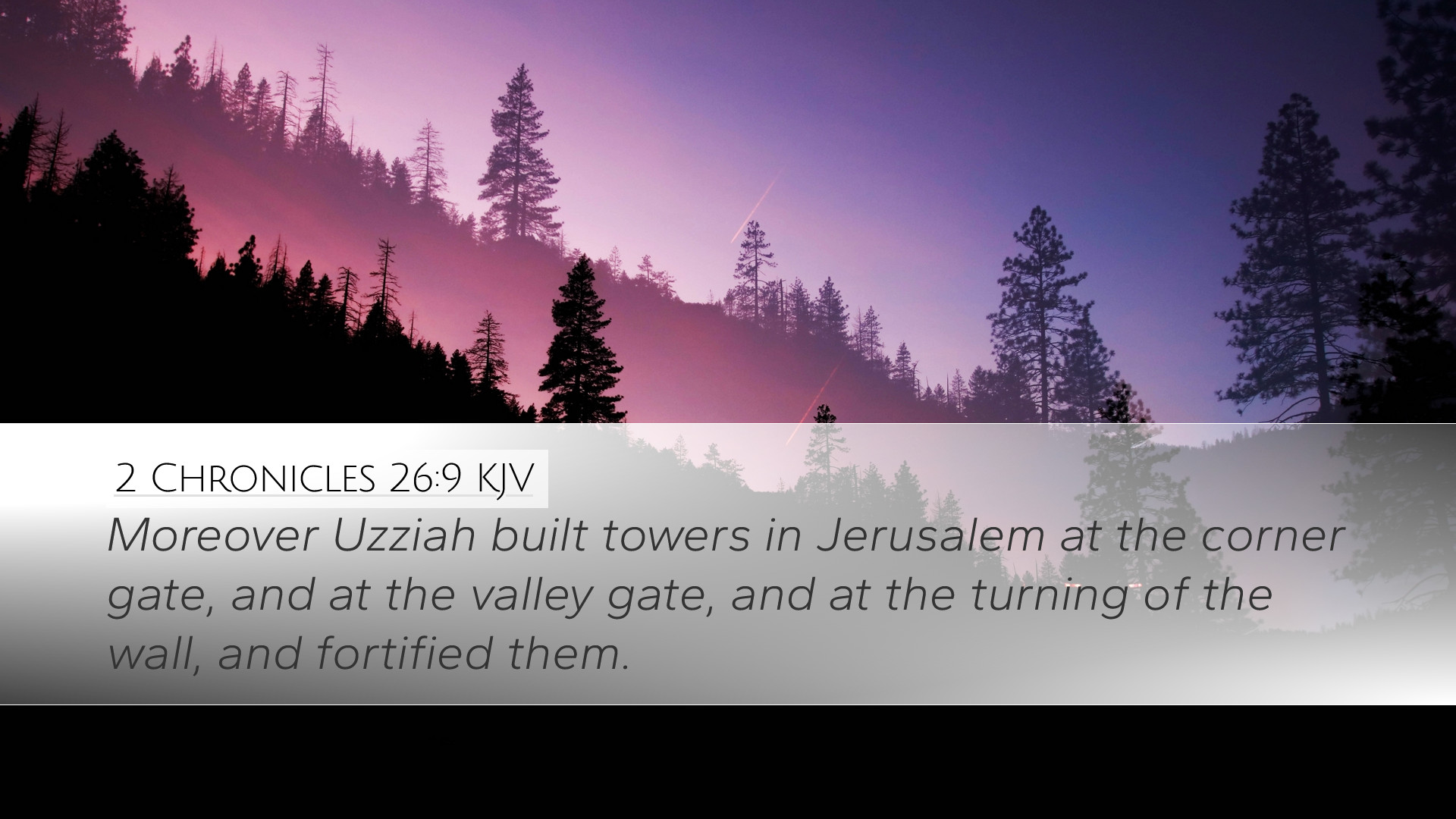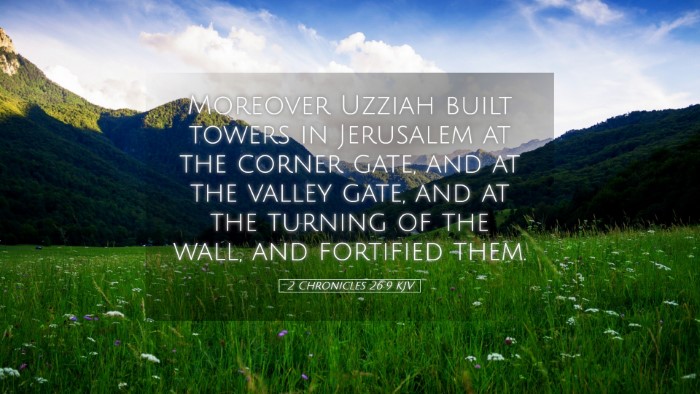Commentary on 2 Chronicles 26:9
2 Chronicles 26:9 states: "Moreover Uzziah built towers in Jerusalem at the corner gate, and at the valley gate, and at the turning of the wall, and fortified them." This verse encapsulates key aspects of King Uzziah's reign, showing his architectural ambitions and military fortifications that indicate a time of prosperity and strength.
Historical Context
The reign of Uzziah (also known as Azariah) is significant in the history of Judah, especially during a period of extended prosperity and military success. He began to rule at the age of sixteen and guided Judah for fifty-two years, a tenure marked by both triumphs and eventual decline. Understanding this context allows us to better appreciate the initiatives he undertook, particularly his efforts in fortification.
Insights from Matthew Henry
Matthew Henry emphasizes the spiritual implications of Uzziah's actions. According to him, "His fortification of Jerusalem not only served physical defenses but symbolized the protective favor of God." Uzziah's achievements were closely linked to his faithfulness to God, reflecting the principle that "when a leader honors God, the people are blessed." Henry suggests that these towers represent not merely military might but also the dedication of Uzziah to create a stronghold for worship and safety.
Insights from Albert Barnes
Albert Barnes, in his commentary, notes that "the construction of these towers was essential for the defense against external threats, reflecting a strategic mind aware of Judah's geopolitical situation." He identifies the significance of locations chosen for the towers, highlighting their functionality at vital access points of Jerusalem. Barnes points out that this endeavor demonstrated Uzziah’s foresight and administrative capability, suggesting a ruler who understood the importance of both military readiness and civic responsibility.
Insights from Adam Clarke
Adam Clarke focuses on the metaphorical understanding of Uzziah’s fortifications, arguing that "the towers can also symbolize our spiritual defenses against temptation and evil." Clarke highlights the importance of building strong foundations in faith, akin to the physical structures Uzziah erected. He interprets the towers as reminders to believers to fortify their lives through prayer and righteousness, guarding their hearts against adversities.
Theological Reflections
This verse allows for rich theological reflection, particularly concerning leadership and divine favor. Uzziah's fortifications reveal much about the relationship between societal strength and spiritual integrity. God's blessing on Uzziah's reign can be seen as a direct result of his dedication to God, and the successes he obtained were not solely due to human effort but divine support.
- Leadership and Responsibility: Leaders are called to protect their people not only physically but spiritually, reflecting God’s character as a protector.
- Faith and Prosperity: The blessing of God often accompanies faithfulness to His service, encouraging modern leaders to seek divine guidance in their endeavors.
- Fortification in Faith: Just as towers protect a city, so too should believers build their lives on the solid rock of Christ to withstand spiritual attacks.
Practical Applications for Today
For pastors and church leaders, Uzziah's actions provide pertinent lessons in leadership. Building "towers" involves creating programs, ministries, and structures that support the church’s mission and fortify its spiritual life. Churches today are urged to prioritize both physical growth and spiritual depth, ensuring that they are fortified against the pressures and threats of a contemporary culture.
The challenge remains to not only build but also maintain these structures in faithfulness to God, recognizing that true strength comes from Him. Pastoral care, community outreach, and establishing a strong foundation of Biblical teaching are essential in nurturing the spiritual “walls” of the congregation.
Conclusion
In conclusion, 2 Chronicles 26:9 serves as a powerful reminder of the significance of fortification, both in a physical and spiritual sense. Uzziah's commitment to building and reinforcing Jerusalem’s defenses reflects the broader theme of seeking to establish a secure and vibrant community under God's guidance. As contemporary believers and leaders, embracing these insights can help in striving for a balanced approach to growth and security, relying on divine favor as our ultimate foundation.


